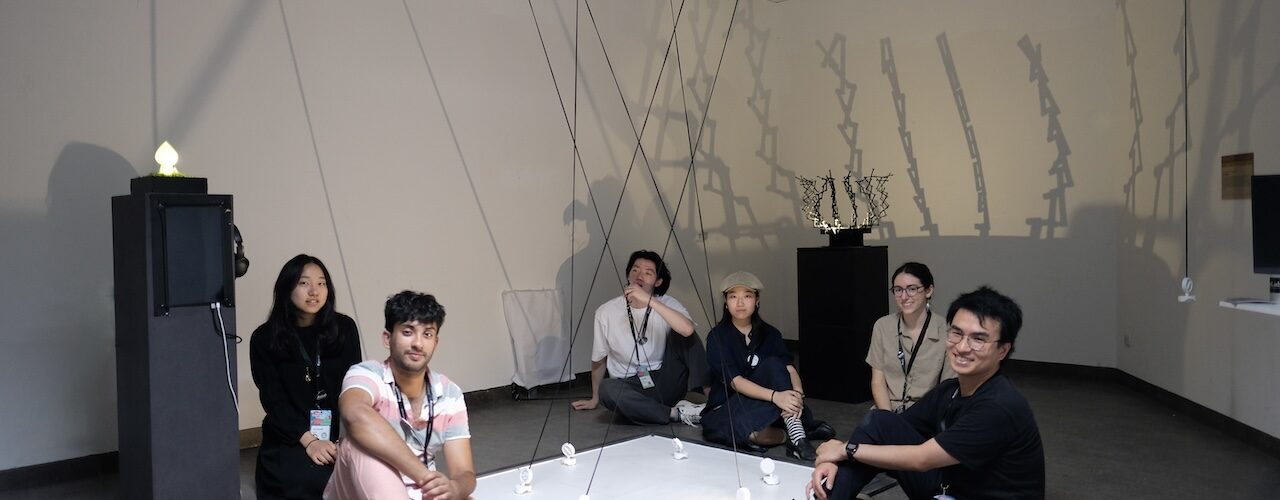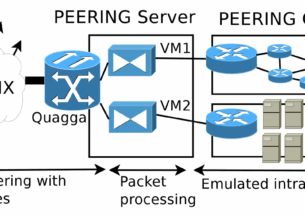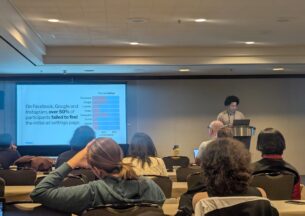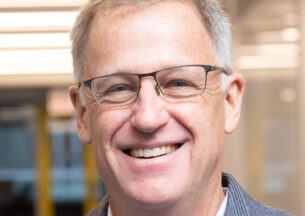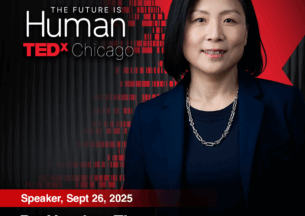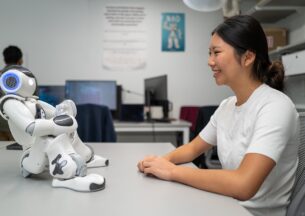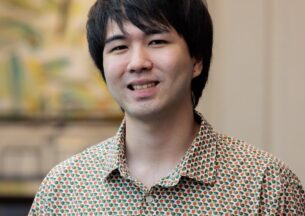AxLab Features Multidisciplinary Works at World’s Largest Art and Technology Festival
Faculty and students from the Department of Computer Science’s Actuated Experience Lab (AxLab) presented at the Ars Electronica Festival in Linz, Austria in September– Europe’s largest festival focusing on art, technology, and society. The festival reported 88,000 visitors, as well as over 1,500 artists, scientists, developers, designers, and activists from 88 countries. The global community contributed to this year’s theme, “Who Owns The Truth?”, by sharing diverse perspectives and having meaningful discussions about truth and ownership, interpretive authority, and sovereignty.
AxLab’s lead faculty member, assistant professor Ken Nakagaki, took a group of undergraduate students to showcase three of their latest experimental works over the five day festival. Much like the diversity that was represented by the global community, AxLab members span across multiple disciplines as well. Students who attended were not just computer science majors, but also media arts and design, sociology, business, economics, and math majors.
“While my lab resides in the Department of Computer Science where we focus heavily on Human-Computer Interaction research, I strongly believe the interdisciplinary creative venues like Ars Electronica Festival helps academic researchers and scholars to broaden perspectives in different artistic, abstract, and aesthetic practices,” said Nakagaki. “These opportunities not only let us produce artistic installations that communicate academic contribution in experiential ways, but also force us to view our research from completely different angles. I do believe the opportunity to practice a study via hands-on demonstration and storytelling compliments UChicago’s interdisciplinary education, where students take diverse classes across the campus, resulting in many of them having multiple majors and minors.”
The exhibit, titled “Actuated Experi[ences/ments] Vol. 1”, featured three interactive installations: Threading Space, Tomo, and Xs Sculpture. Each display explored how actuation technology and AI could shape our future through their integration into everyday spaces, toys, and materials. The lab brought prototypes that focused on an open question: “How would actuated technologies ‘actuate’ people?”
Threading Space and Xs Sculpture were based on AxLab’s recently published papers, and demonstrated AxLab’s approach to impact not only the research community, but also the art and design community through outreach and exploring ideas not constrained to a single domain.
 Threading Space, created by fourth-year MAAD and sociology major You Li, fourth-year CS major Emilie Faracci, fourth-year CS and economics major Ramarko Bhattachara, fourth-year CS and math major Harrison Dong, and a collaborating PhD student from the University of Southern California Yi Zheng, develops spatial experiences by dynamically and geometrically reconfiguring physical lines. Using a swarm of mobile robots on the floor and ceiling to control lines of thread (based on a CHI23 paper AeroRigUI), the work explores how human’s spatial perception can be manipulated.
Threading Space, created by fourth-year MAAD and sociology major You Li, fourth-year CS major Emilie Faracci, fourth-year CS and economics major Ramarko Bhattachara, fourth-year CS and math major Harrison Dong, and a collaborating PhD student from the University of Southern California Yi Zheng, develops spatial experiences by dynamically and geometrically reconfiguring physical lines. Using a swarm of mobile robots on the floor and ceiling to control lines of thread (based on a CHI23 paper AeroRigUI), the work explores how human’s spatial perception can be manipulated.
The exhibit sparked meaningful discussions between visitors and demonstrators.
“Visitors commented on the mesmerizing quality of the Threading Space sculpture and made connections between Threading Space and their own work or life experiences,” said Faracci. “It gave us more insight into how we can broaden the perspective of AxLab’s work going forward. The opportunity to take our research outside of the lab environment and explore what impact it could have on people coming from all different backgrounds, including engineering, art, and education was exciting. As a student, these conversations allowed me to create meaningful relationships with people who care about art and technology, which is especially important because work in this field benefits from being collaborative and interdisciplinary.” 
Li enjoyed how Threading Space allowed her to self-reflect on larger questions.
“Exhibiting our work in the Ars Electronica Festival enabled me to further connect our own artistic intentions to the global contemporary art and tech sphere. The chance of interacting with the most experimental media artists around the world pushed me to reflect critically on our project and beyond to our bodily relation with technology in the global discourse. It was eye-opening to engage with such a wide range of multimodal media art forms and to re-imagine the future of human-technology interaction.”
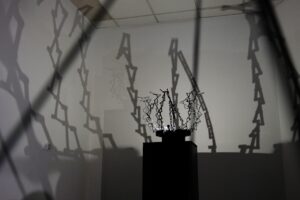 Xs caused similar wonderment from visitors with its shape-changing user interface with high expandability and customizability (based on recently published paper in TEI23). The reconfigurable interactive scissor mechanisms show how 3D forms can be created as kinetic sculpture and morph into various kinetic artifacts. The work was created by third-year CS and MAAD major Skylar Liu and third-year PhD student Vasco Xu.
Xs caused similar wonderment from visitors with its shape-changing user interface with high expandability and customizability (based on recently published paper in TEI23). The reconfigurable interactive scissor mechanisms show how 3D forms can be created as kinetic sculpture and morph into various kinetic artifacts. The work was created by third-year CS and MAAD major Skylar Liu and third-year PhD student Vasco Xu.
“With Xs Sculpture, we explored how media art has the ability to transcend the boundaries of traditional fine art, which tends to be defined by attributes like line and shape, light and shadow, subject and object,” explained Liu. “We also wanted to play with how shape-changing mechanisms can simulate the natural when creating the interactive animations of the sculpture.”
Those who interacted with Xs enjoyed how the artistic aspects of the sculpture were left up to interpretation.
 “Xs was a perfect case study of the power and whimsical nature of the human imagination,” said Dong, who worked on Threading Space. “Some visitors stared at the contraption in awe, seeing it as a mechanical representation of masochism and lust, while others flinched almost with fear as the sculpture’s arms reached toward their faces like some ravenous horror movie creature. Others still expressed their lighthearted desires to purchase Xs as a replacement for their high-maintenance house plants. As such, Xs accomplished its purpose as a work of art: to leave the ambiguity of intent and purpose up to the viewer’s interpretation.”
“Xs was a perfect case study of the power and whimsical nature of the human imagination,” said Dong, who worked on Threading Space. “Some visitors stared at the contraption in awe, seeing it as a mechanical representation of masochism and lust, while others flinched almost with fear as the sculpture’s arms reached toward their faces like some ravenous horror movie creature. Others still expressed their lighthearted desires to purchase Xs as a replacement for their high-maintenance house plants. As such, Xs accomplished its purpose as a work of art: to leave the ambiguity of intent and purpose up to the viewer’s interpretation.”
Tomo was the final installation showcased at the Ars Electronica Festival and was created by third-year math and MAAD major Lilith Yu and a collaborating fourth-year CS major at Northwestern University, Marco Wang. Tomo is a physical toy that utilizes artificial intelligence (AI) to chat and play with humans. It is designed to ask intriguing questions, spark curiosity, foster creativity, and encourage exploration. As people engage with Tomo, it becomes increasingly attuned to their feelings, displaying a genuine “care” for the user.
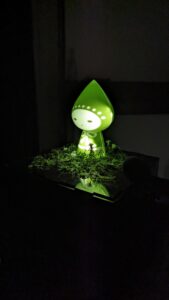 Powered by a large-language-model to chat with humans, users could choose to go on an imaginative time-traveling journey to learn about a historical period in first person perspective, or a space-traveling adventure to practice world-building skills. Many people finished the experience with a smile on their face and said that they felt creative and warm inside.
Powered by a large-language-model to chat with humans, users could choose to go on an imaginative time-traveling journey to learn about a historical period in first person perspective, or a space-traveling adventure to practice world-building skills. Many people finished the experience with a smile on their face and said that they felt creative and warm inside.
The idea for Tomo originated out of Nakagaki’s class, “A Practice in Art and Technology”, where students were encouraged to push the boundaries of art and technology. Those who worked on Tomo got the unique experience of being able to interact and show their work to artists they surveyed and studied in class.
“I’m grateful to have had the opportunity to improve my project from the Art and Technology class and show it to a wider audience at Ars Electronica,” said Yu. “The feedback I received from the class allowed me to improve the user interaction and experience to deliver feelings of curiosity and creativity.”
Yu wanted to use the festival’s theme to show participants how AI could be used for good.
“Inspired by traditional Japanese Kokeshi dolls, I designed the toy in hopes of bringing back the tangibility and personalization that existed in traditional toys. Tomodachi means “friends” in Japanese, and with this year’s theme of “Who Owns the Truth,” I hope that rather than using AI technologies to spread fake news or denounce each other, they can be leveraged to empower people for the common good and allow personalized, fun, and interactive learning to be available for all.”
 It was a dream of Nakagaki’s to bring students to the Ars Electronica Festival because it had inspired his work in the past. Seeing his students stimulated and inspired made him eager to continue working towards opportunities for the larger UChicago community. The connections made at venues like this can be invaluable to everyone involved.
It was a dream of Nakagaki’s to bring students to the Ars Electronica Festival because it had inspired his work in the past. Seeing his students stimulated and inspired made him eager to continue working towards opportunities for the larger UChicago community. The connections made at venues like this can be invaluable to everyone involved.
“We had fruitful interactions with people not only from around the world, but also from our neighboring Chicago communities, including SAIC (School of Art Institute Chicago), and MSI (Museum of Science and Industry),” said Nakagaki. “The festival became a wonderful opportunity in so many different facets.”


